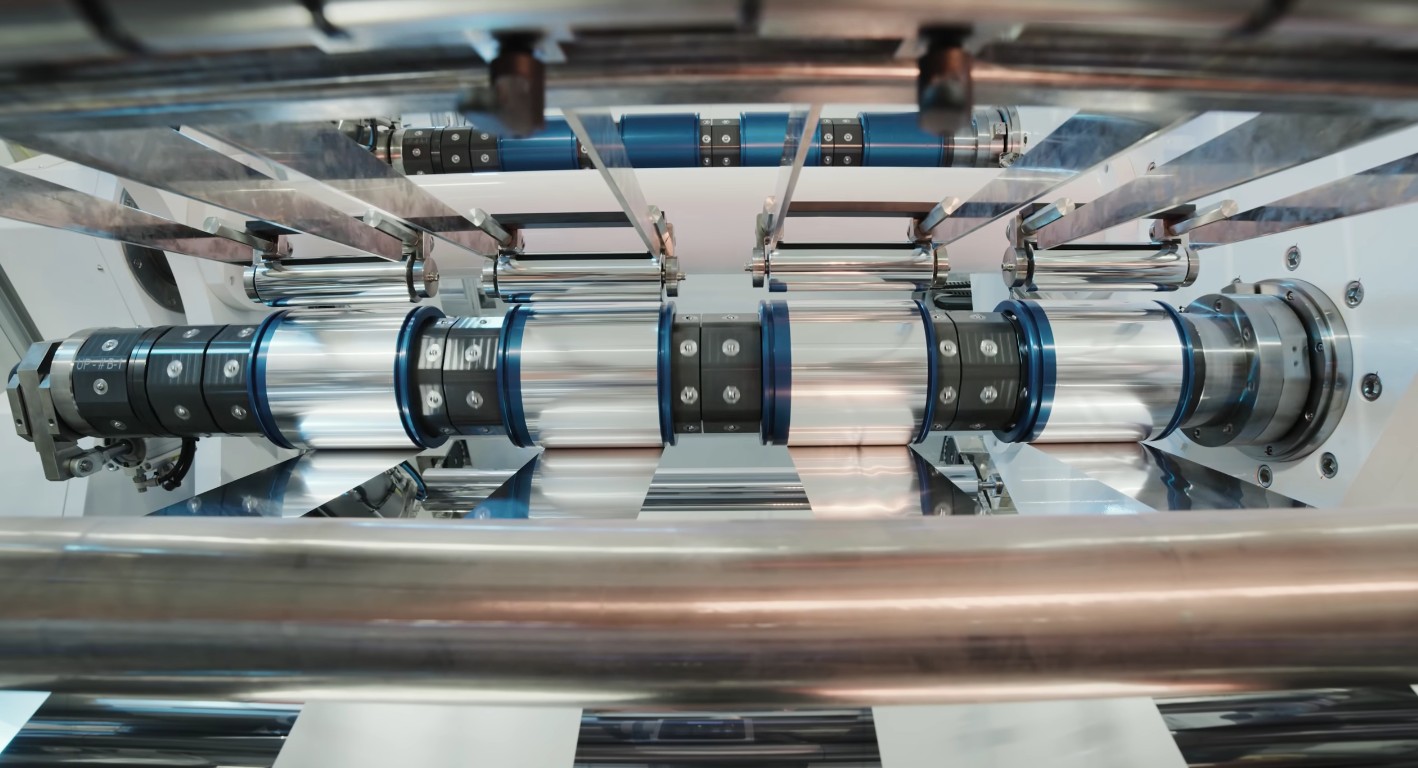
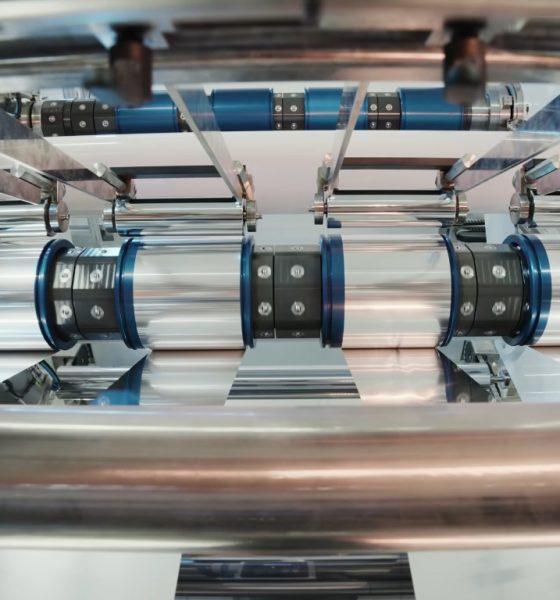
News
Elon Musk’s Tesla Model 3 cobalt-free strategy is ushering in an LFP battery movement
About a year ago, Tesla effectively shocked the electric vehicle industry by announcing that the Made-in-China Model 3 Standard Range Plus would be using lithium iron phosphate (LFP) batteries produced by Contemporary Amperex Technology (CATL). It seemed like an unprecedented decision, considering the company’s image as a maker of fast, powerful, premium cars.
LFP batteries are cheaper to produce than NCM (nickel-cobalt-manganese) and NCA (nickel-cobalt-aluminum) batteries, but they generally have lower energy density. This meant that usually, vehicles equipped with LFP cells end up lacking in range and charging. Tesla’s move towards LFP could then be considered a gamble–one that could have resulted in drawbacks for the Model 3 in China.
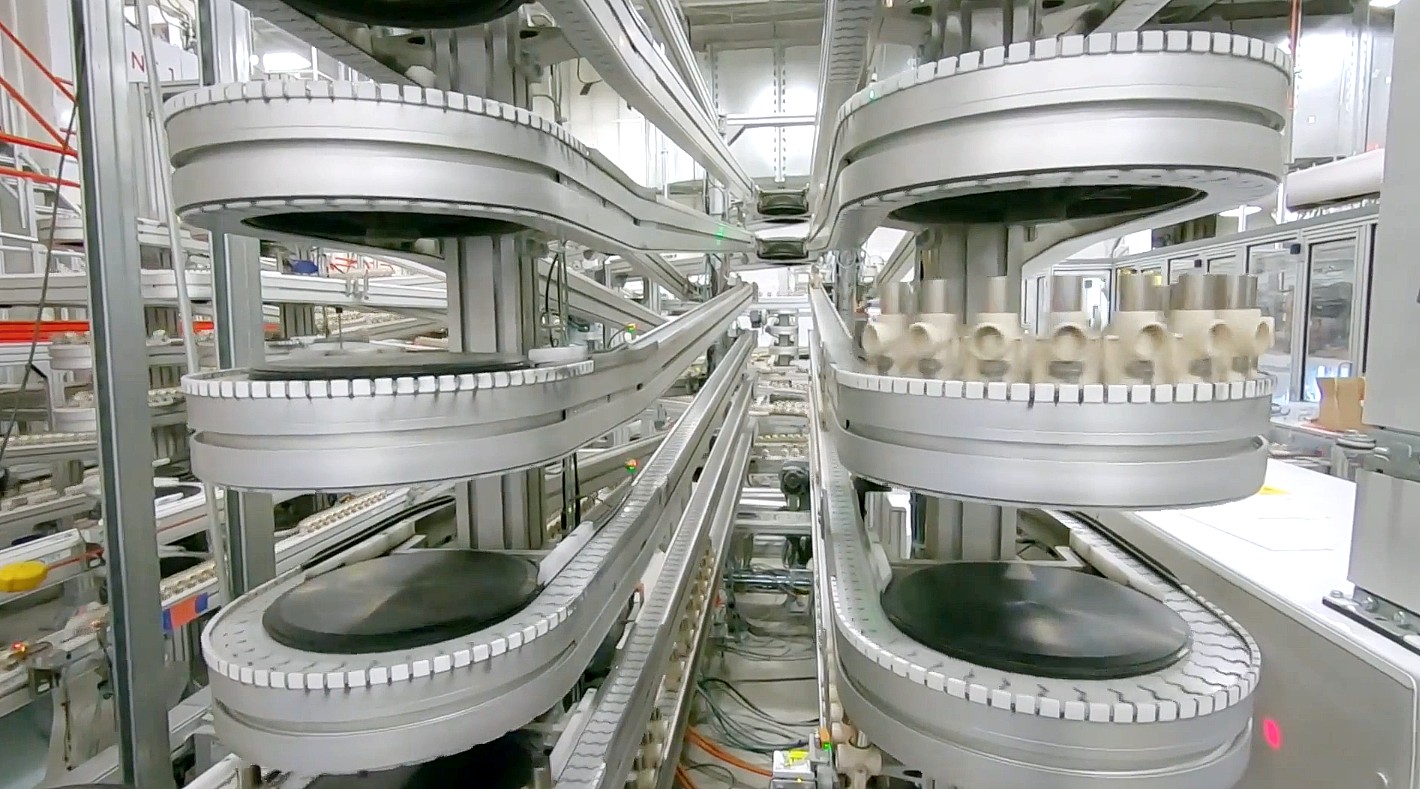
Today, it seems safe to say that the Silicon Valley-based electric car maker’s gamble has been successful. Recent tweets from Elon Musk even point to the idea that LFP is the way to go for Tesla’s standard range vehicles. This was especially notable, considering that cobalt and nickel prices have been rising over the past years. And with the advent of more electric cars in the market, securing more long-term supply for raw materials is incredibly important.
True to form, Tesla’s adoption of LFP batteries was immediately felt by the greater battery market. As noted in a Mining.com report, the 55KWh LFP-battery Tesla Model 3 from China captured 5.9% of the global full electric car market in terms of battery capacity in its second full month of sales. This was despite the Made-in-China Model 3 not being sold in the United States.
Based on Adamas Intelligence data, the momentum of Tesla’s LFP-equipped Model 3 only increased from that point. Propelled further by deliveries to Europe, the LFP-battery China-made sedan comprised 46% of all Model 3 sales in January and a remarkable 32% of the battery capacity in all LFP-equipped cars globally. This trend, Adamas’ data showed, boosted LFP’s overall share in the global battery market in terms of capacity to 18.5% in January 2021.
This was a remarkable milestone for LFP batteries, considering that it only commanded 1% at the beginning of last year and 3% by June 2020. Adamas Intelligence’s Head of Data and Analytics Alla Kolesnikova noted that the momentum of LFP cells had been particularly felt in China. In 2020, the adoption of the cobalt-free batteries saw a resurgence in the market, with both veteran automakers and younger EV companies adopting the technology.
“LFP battery capacity deployed onto roads increased six-fold and we continue to see cathode manufacturers ramping up output and a growing list of the automakers in China announcing upcoming model-versions that will incorporate LFP cells. Among the more prominent are Xpeng, Seres, and VW,” Kolesnikova said.
Roskill, one of the world’s first management consultancies and a key player in critical materials supply chain intelligence, has determined that LFP cathode and precursor material manufacturing capacity is currently up 10-fold in January-February 2021 compared to the same months in 2020. A good part of this is the adoption of the batteries by notable EV players like Tesla, as well as breakthroughs in the cobalt-free batteries themselves.
Roskill analyst Kevin Gunan Shang noted that LFP batteries are looking to be an excellent fit for cell-to-pack manufacturing, which would be adopted by Tesla for its mass-market vehicles like the Model Y. The analyst also pointed to the claims of Volkswagen-backed Chinese battery manufacturer Gotion, which noted that its latest LFP battery had achieved a cell-level energy density of 210 Wh/kg, putting it on par with NCM 523.
Don’t hesitate to contact us for news tips. Just send a message to tips@teslarati.com to give us a heads up.

News
BREAKING: Tesla launches public Robotaxi rides in Austin with no Safety Monitor
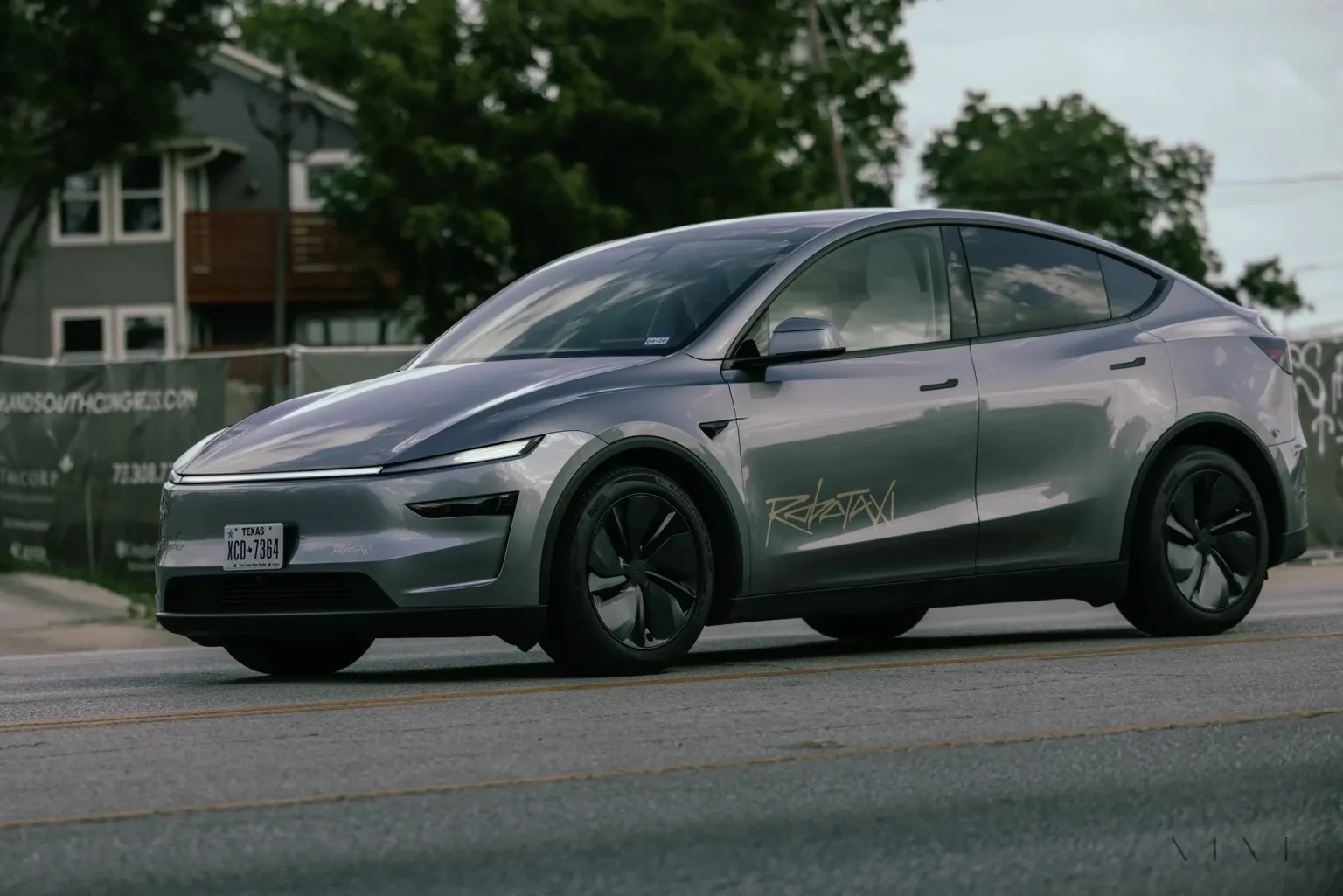
Tesla has officially launched public Robotaxi rides in Austin, Texas, without a Safety Monitor in the vehicle, marking the first time the company has removed anyone from the vehicle other than the rider.
The Safety Monitor has been present in Tesla Robotaxis in Austin since its launch last June, maintaining safety for passengers and other vehicles, and was placed in the passenger’s seat.
Tesla planned to remove the Safety Monitor at the end of 2025, but it was not quite ready to do so. Now, in January, riders are officially reporting that they are able to hail a ride from a Model Y Robotaxi without anyone in the vehicle:
I am in a robotaxi without safety monitor pic.twitter.com/fzHu385oIb
— TSLA99T (@Tsla99T) January 22, 2026
Tesla started testing this internally late last year and had several employees show that they were riding in the vehicle without anyone else there to intervene in case of an emergency.
Tesla has now expanded that program to the public. It is not active in the entire fleet, but there are a “few unsupervised vehicles mixed in with the broader robotaxi fleet with safety monitors,” Ashok Elluswamy said:
Robotaxi rides without any safety monitors are now publicly available in Austin.
Starting with a few unsupervised vehicles mixed in with the broader robotaxi fleet with safety monitors, and the ratio will increase over time. https://t.co/ShMpZjefwB
— Ashok Elluswamy (@aelluswamy) January 22, 2026
Tesla Robotaxi goes driverless as Musk confirms Safety Monitor removal testing
The Robotaxi program also operates in the California Bay Area, where the fleet is much larger, but Safety Monitors are placed in the driver’s seat and utilize Full Self-Driving, so it is essentially the same as an Uber driver using a Tesla with FSD.
In Austin, the removal of Safety Monitors marks a substantial achievement for Tesla moving forward. Now that it has enough confidence to remove Safety Monitors from Robotaxis altogether, there are nearly unlimited options for the company in terms of expansion.
While it is hoping to launch the ride-hailing service in more cities across the U.S. this year, this is a much larger development than expansion, at least for now, as it is the first time it is performing driverless rides in Robotaxi anywhere in the world for the public to enjoy.
Investor's Corner
Tesla Earnings Call: Top 5 questions investors are asking
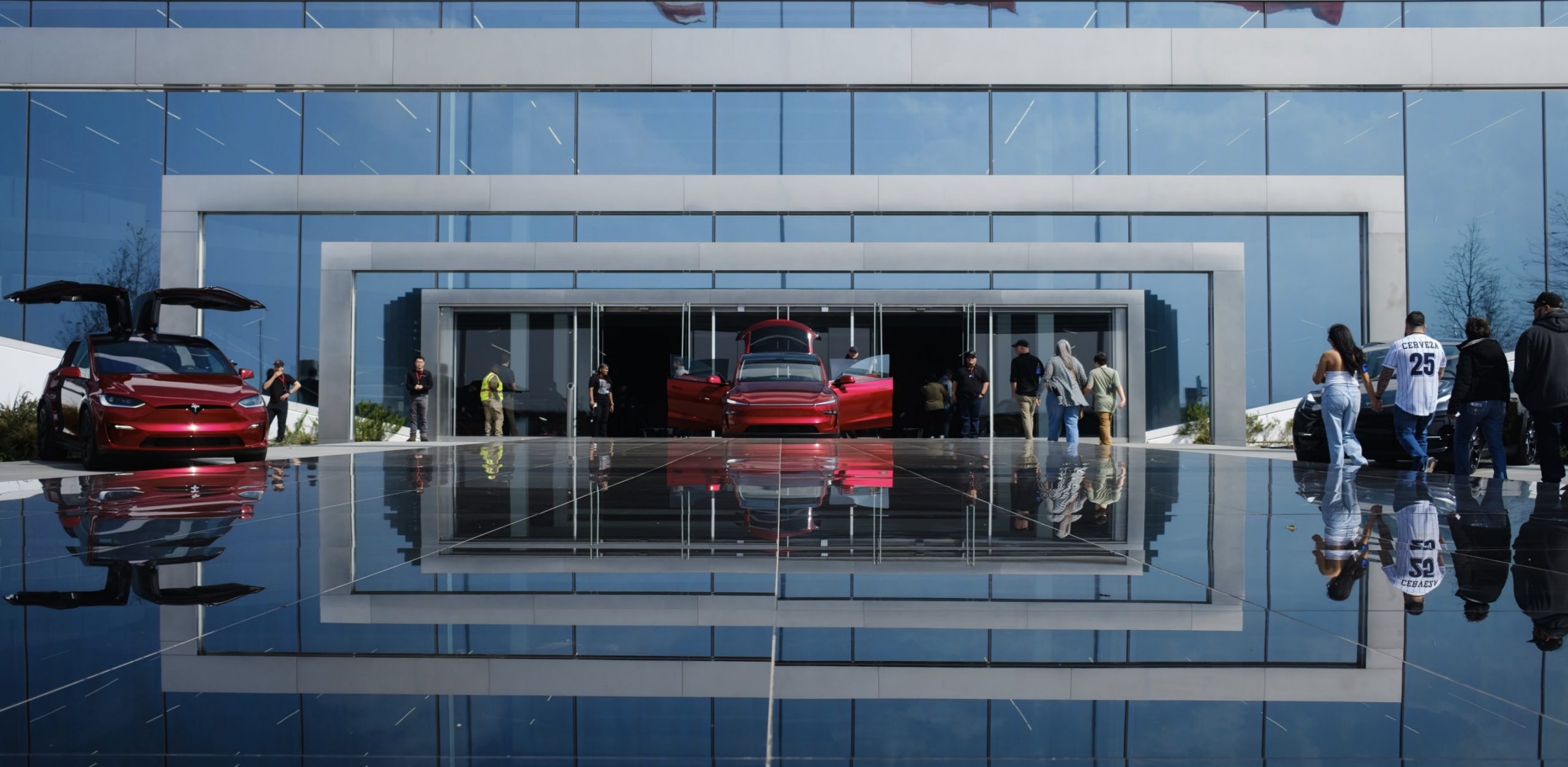
Tesla has scheduled its Earnings Call for Q4 and Full Year 2025 for next Wednesday, January 28, at 5:30 p.m. EST, and investors are already preparing to get some answers from executives regarding a wide variety of topics.
The company accepts several questions from retail investors through the platform Say, which then allows shareholders to vote on the best questions.
Tesla does not answer anything regarding future product releases, but they are willing to shed light on current timelines, progress of certain projects, and other plans.
There are five questions that range over a variety of topics, including SpaceX, Full Self-Driving, Robotaxi, and Optimus, which are currently in the lead to be asked and potentially answered by Elon Musk and other Tesla executives:
- You once said: Loyalty deserves loyalty. Will long-term Tesla shareholders still be prioritized if SpaceX does an IPO?
- Our Take – With a lot of speculation regarding an incoming SpaceX IPO, Tesla investors, especially long-term ones, should be able to benefit from an early opportunity to purchase shares. This has been discussed endlessly over the past year, and we must be getting close to it.
- When is FSD going to be 100% unsupervised?
- Our Take – Musk said today that this is essentially a solved problem, and it could be available in the U.S. by the end of this year.
- What is the current bottleneck to increase Robotaxi deployment & personal use unsupervised FSD? The safety/performance of the most recent models or people to monitor robots, robotaxis, in-car, or remotely? Or something else?
- Our Take – The bottleneck seems to be based on data, which Musk said Tesla needs 10 billion miles of data to achieve unsupervised FSD. Once that happens, regulatory issues will be what hold things up from moving forward.
- Regarding Optimus, could you share the current number of units deployed in Tesla factories and actively performing production tasks? What specific roles or operations are they handling, and how has their integration impacted factory efficiency or output?
- Our Take – Optimus is going to have a larger role in factories moving forward, and later this year, they will have larger responsibilities.
- Can you please tie purchased FSD to our owner accounts vs. locked to the car? This will help us enjoy it in any Tesla we drive/buy and reward us for hanging in so long, some of us since 2017.
- Our Take – This is a good one and should get us some additional information on the FSD transfer plans and Subscription-only model that Tesla will adopt soon.
Tesla will have its Earnings Call on Wednesday, January 28.
Elon Musk
Elon Musk shares incredible detail about Tesla Cybercab efficiency
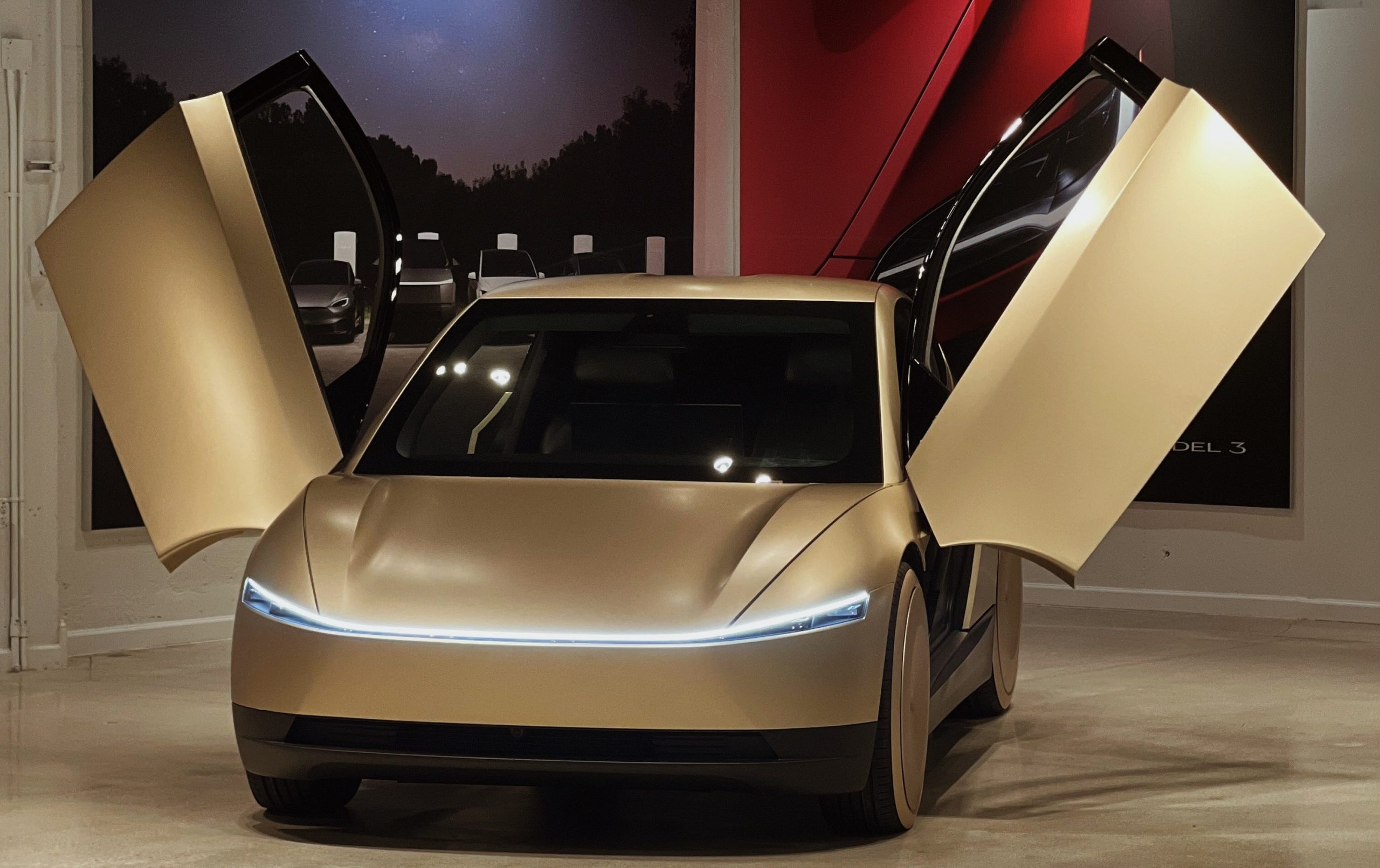
Elon Musk shared an incredible detail about Tesla Cybercab’s potential efficiency, as the company has hinted in the past that it could be one of the most affordable vehicles to operate from a per-mile basis.
ARK Invest released a report recently that shed some light on the potential incremental cost per mile of various Robotaxis that will be available on the market in the coming years.
The Cybercab, which is detailed for the year 2030, has an exceptionally low cost of operation, which is something Tesla revealed when it unveiled the vehicle a year and a half ago at the “We, Robot” event in Los Angeles.
Musk said on numerous occasions that Tesla plans to hit the $0.20 cents per mile mark with the Cybercab, describing a “clear path” to achieving that figure and emphasizing it is the “full considered” cost, which would include energy, maintenance, cleaning, depreciation, and insurance.
Probably true
— Elon Musk (@elonmusk) January 22, 2026
ARK’s report showed that the Cybercab would be roughly half the cost of the Waymo 6th Gen Robotaxi in 2030, as that would come in at around $0.40 per mile all in. Cybercab, at scale, would be at $0.20.
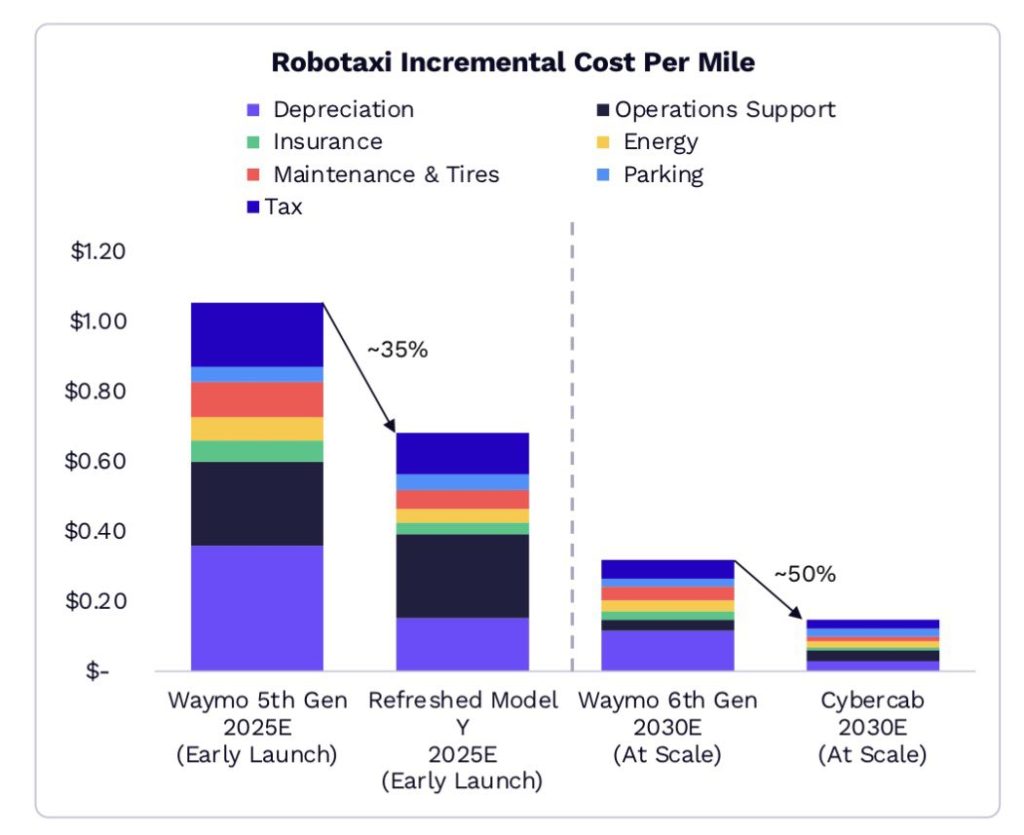
Credit: ARK Invest
This would be a dramatic decrease in the cost of operation for Tesla, and the savings would then be passed on to customers who choose to utilize the ride-sharing service for their own transportation needs.
The U.S. average cost of new vehicle ownership is about $0.77 per mile, according to AAA. Meanwhile, Uber and Lyft rideshares often cost between $1 and $4 per mile, while Waymo can cost between $0.60 and $1 or more per mile, according to some estimates.
Tesla’s engineering has been the true driver of these cost efficiencies, and its focus on creating a vehicle that is as cost-effective to operate as possible is truly going to pay off as the vehicle begins to scale. Tesla wants to get the Cybercab to about 5.5-6 miles per kWh, which has been discussed with prototypes.
Additionally, fewer parts due to the umboxed manufacturing process, a lower initial cost, and eliminating the need to pay humans for their labor would also contribute to a cheaper operational cost overall. While aspirational, all of the ingredients for this to be a real goal are there.
It may take some time as Tesla needs to hammer the manufacturing processes, and Musk has said there will be growing pains early. This week, he said regarding the early production efforts:
“…initial production is always very slow and follows an S-curve. The speed of production ramp is inversely proportionate to how many new parts and steps there are. For Cybercab and Optimus, almost everything is new, so the early production rate will be agonizingly slow, but eventually end up being insanely fast.”








